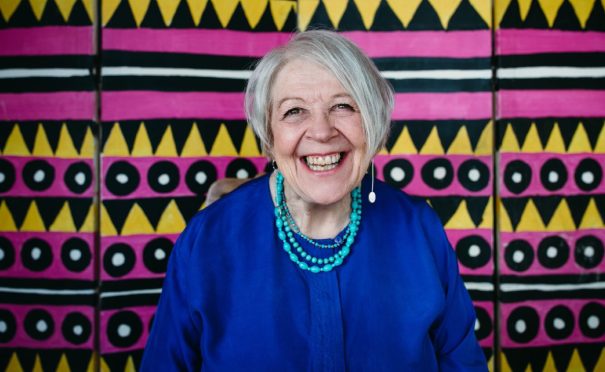
In her hands, Liz Lochhead is holding her newest book, and most of her life’s work. “There it is,” she says. “A great big stonking thing.”
It is indeed quite a hefty tome. For the first time, all of Scotland’s second modern Makar’s published poetry has been put together in one release.
Titled A Handsel, it also includes her first new poems since 2016. Although she daren’t look too closely in case she’s missed a typo, there’s a clear sense of pride in bringing her legacy together.
The poet and playwright, 75, is chatting to The Sunday Post at her home in the West End of Glasgow, at a window perfect for people watching. It’s where she often sits to write and draw, and would also spend nights, a drink in hand, watching the world go by with her late husband, Tom Logan, who died in 2010.
Still getting back on her feet after a hip operation, she’s just returned from a trip to France and spent the night before signing 200 copies of the new book.
“I was cursing the book most of the year,” she admits. “I was going, ‘this is embarrassing, I wish it wasn’t happening, maybe it shouldn’t be’, but now I think ‘what a privilege’.
“My health was seriously in decline because the arthritis was really kicking in, so it was very difficult for me and my editor to get together and do it.
“I was up till 5.30 the day I went into hospital to get my hip done trying to get at least the new poems done!”
A life’s work
A Handsel follows the 50th anniversary release of Liz’s first collection, Memo For Spring, last year. The two sit side by side on the table in front of us, both with pictures of the poet on the front, taken five decades apart.
“Is that the same person as that?” she asks rhetorically. “In a way it is, but she’s got white hair and she’s got brown. My mum, who encouraged me to learn To A Mouse off by heart, would’ve been amazed and so chuffed, as would my dad.
“My husband probably wouldn’t have been surprised because he was used to me being jammy and getting a lot of luck that I didn’t necessarily deserve.
“I was his favourite poet. But his favourite poetry was Tom Leonard’s.”
Liz grew up in Craigneuk, a former mining village just outside Motherwell. She initially dreamed of becoming a painter but, while studying at Glasgow School of Art in the late 1960s, she became immersed in the world of poetry, inspired by the likes of Norman MacCaig and Edwin Morgan.
She recalls living in Glasgow’s southside and making regular trips to Pollokshaws Public Library to get MacCaig collections restamped.
In 1972, she supported the man himself at an event at Edinburgh University’s poetry festival, which led to an approach from a publisher for Memo For Spring.
“It was magic to hear him reading because he was a master. He really took his time, made people laugh and see pictures. He was a one off.”
She remembers MacCaig’s advice to always leave the audience wanting more – although admits she might not always have stuck to that maxim. She also recalls her first time performing in front of a crowd, something she still does regularly with a number of appearances scheduled for the coming weeks.
“The first time was at Glasgow School of Art, and I was on with Robbie Coltrane, who was two years behind me. Robin McMillan, as he was then, reading EE Cummings’ poems brilliantly.
“I remember being on, being rotten and thinking I’d better get my game up and practise.”
Predecessor’s influence
A conversation with Liz could likely fill a book of its own, such is the breadth and intrigue of her anecdotes. Personal tales are interspersed with titans of Scottish literature and even phone calls from first ministers.
From 2011 to 2016, she was asked by Alex Salmond to be Makar, succeeding her great friend Edwin Morgan, who had died the previous year.
A likely contributor to her appointment to the role had been reading his poem, Open the Doors! at the opening of the Scottish Parliament building in 2004 – one of her fondest memories.
“That was terrifying. Sean Connery sitting behind you, Nicola Benedetti giving it laldy. Eddie was in a home at the time and I went down and he made me rehearse quite a bit. It was a long poem, full of tongue twisters.
“I couldn’t get it under four minutes like I was supposed to. I’d read it down the phone to my friend Siobhan Redmond in London and she said to take my time more. And I said, but it’s got to be four minutes and she said, what are they gonna do? Shoot you when you get to your feet?
“I was scared in case I’d stand up and throw up. But once you got started, you had to do it right for Eddie. He was in his late 80s, not walking about much. He did get over to the parliament building though, and he did feel really strongly that it was a great thing. His poem is amazing.”
Putting the book together took Liz back to all of these memories and more – even if she still remains unsatisfied with her own poems for that occasion.
“When proofing it, I was ashamed of some of them,” she said. “Also, it was like going back over my life. The poems aren’t autobiographical, but they’re emotionally autobiographical. They can’t not be.
“I was looking back on them as if they were by somebody else in a way, but connecting up with them again I was thinking about things I hadn’t thought about.
“What I could often remember was writing the poem, not the angst or the happiness or whatever had caused it.
“Jackie Kay said such a good thing about being a voice that’s many tongues. A lot of the things I write aren’t in my voice but they’re still very personal to me.”
‘The tap does go off’
With a selection of new works included, the book isn’t a full stop or a bookend on Liz’s career. She’s still writing, with a number of projects brewing. The next day, she’s going for her “daily walk with the sticks” to The Burrell Collection for research.
“Not everything works out by any means. But when it starts to work out enough for you to continue going, then I’m quite happy.
“The tap does go off. A lot of the time I’ve got to forcibly turn it on. I love writing when I can write. I hate writing when I’m stuck and forcing myself. It’s a pleasure once it’s happening for you,” she explained.
“When the hip was getting worse I didn’t write anything for a long while. Working on the new ones got me going. It was a bit of an emotional rollercoaster getting the book out and now I feel free of it.
“I quite liked the new ones once I’d done them out loud and realised that they go down well, that was a relief.
“I didn’t think I had enough new poems and they’re all over the place, a rag bag, but once they’re all put together, it’s a set.”
Opening the book, she comes to one page that is particularly poignant. A bringing together of her legacy, it also pays tribute to cherished loved ones lost.
“In memory of my father and mother, John and Margaret Lochhead, and my husband, Tom Logan,” she reads.
“It’s hard to say those words, but it’s the truth. I could’ve done a thanks page but I’d miss someone important out and make a mess of it. So I thought leave it at that.
“Your life is your life, and that’s what it is. The book’s helped me with that – I don’t mind being old so much as I did before it came out. I don’t mind if I don’t get another book out. I’ll mind if I don’t get the fun of trying to write things anymore, even if I don’t get them done.”
Liz Lochhead – A Handsel is out now.

Enjoy the convenience of having The Sunday Post delivered as a digital ePaper straight to your smartphone, tablet or computer.
Subscribe for only £5.49 a month and enjoy all the benefits of the printed paper as a digital replica.
Subscribe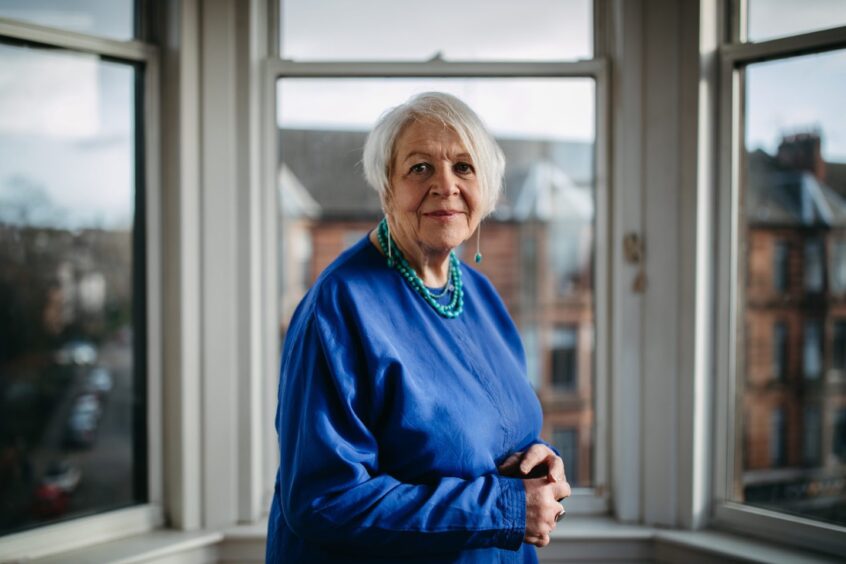 © Andrew Cawley
© Andrew Cawley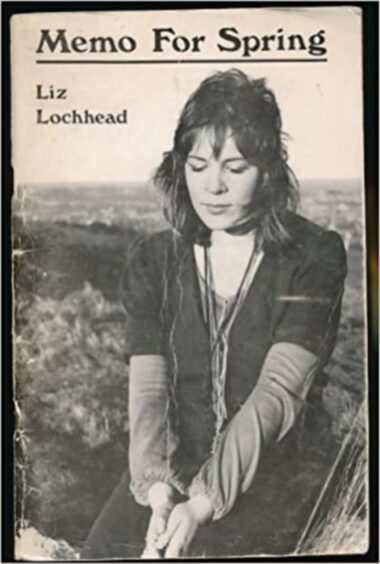
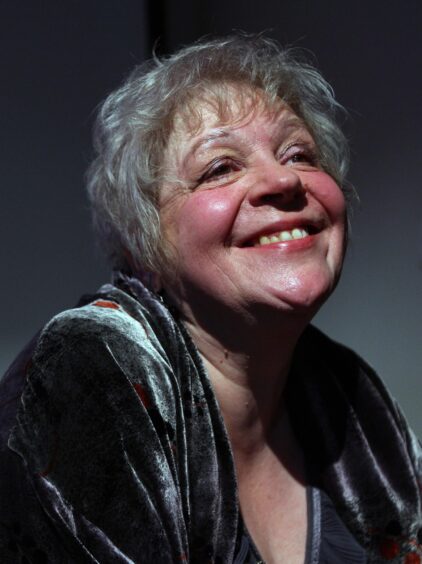 © PA Wire/Press Association Images
© PA Wire/Press Association Images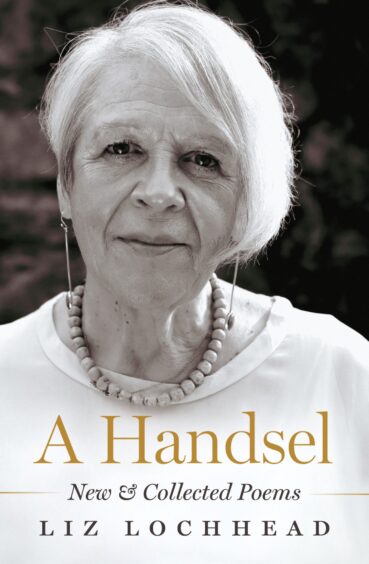 © Supplied
© Supplied